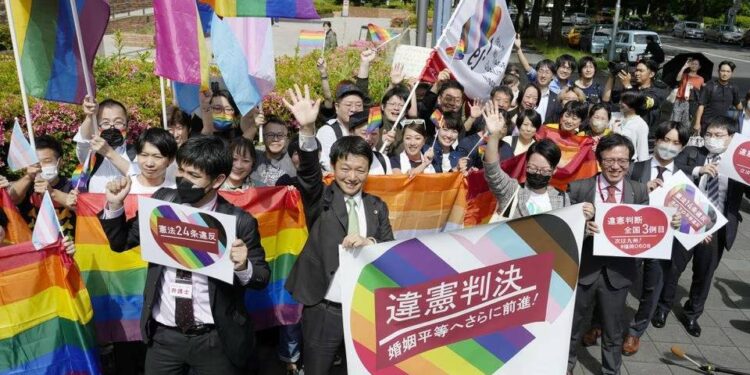By Oyintari Ben
While falling short of activists’ expectations, a Japanese court’s verdict on same-sex marriage on Thursday highlighted worries about the dignity and human rights of same-sex couples and the constitutionality of the ban.
The Fukuoka District Court’s decision, which came a week after another district court declared the prohibition on same-sex marriage illegal, gave the LGBTQ community in Japan—the only country in the Group of Seven without such protection—more reason to hope for change.
Over the past two years, Japan has seen five decisions on same-sex marriage: two verdicts that the prohibition is unconstitutional, one that it is not, and two, like the one on Thursday, that uphold the ban but raise additional rights concerns.
Last year, a Tokyo court upheld the ban but declared that same-sex families’ lack of legal protection infringed their rights.
The Fukuoka court concurred with the Tokyo ruling, stating that while prohibiting same-sex unions was constitutional, it violated a provision stating that marriage and family issues should be based on individual dignity, labelling it a “state of unconstitutionality”.
Plaintiff Masahiro, who only provided his first name, expressed his satisfaction with the general direction of the court cases.
He stated at a news conference that “four of the five rulings so far have either found that prohibiting same-sex marriage is unconstitutional or is at odds with part of the constitution.”
“I’m relieved because it feels like we made progress.”
According to opinion polls, 70% of the population favours same-sex unions, while the conservative government led by Prime Minister Fumio Kishida is against it.
In February, Kishida fired an aide who had angered the public by claiming that same-sex marriage would drive people out of Japan and that he would not want to live next to gay, lesbian, bisexual, or transgender couples.
Despite intense pressure from other G7 countries, particularly the United States, in the months leading up to Japan’s hosting of the G7 leaders’ summit last month, Kishida has remained uncommitted.
A bill fostering “understanding” of LGBTQ persons was supposed to be passed by Kishida’s administration before the G7 summit.
However, conservative opposition caused such significant delays that a watered-down version will probably only be put to a vote next week.




































